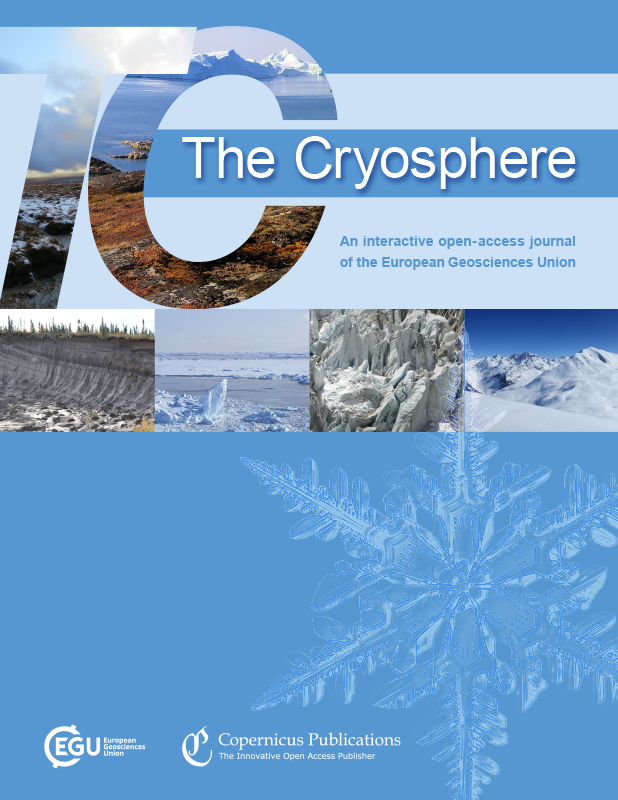Environmental spaces for palsas and peat plateaus are disappearing at a circumpolar scale
IF 4.4
2区 地球科学
Q1 GEOGRAPHY, PHYSICAL
引用次数: 3
Abstract
Abstract. Anthropogenic climate change threatens northern permafrost environments. This compromises the existence of permafrost landforms, such as palsas and peat plateaus, which have been assessed to be critically endangered habitats. In this study, we integrated geospatial datasets and statistical methods to model the suitable environments for palsas and peat plateaus across the Northern Hemisphere permafrost region. The models were calibrated using data from years 1950–2000. The effects of climate change on the suitable environments for the landforms were assessed by using low-, moderate-, and high-emissions scenarios (Representative Concentration Pathway climate scenarios: RCP2.6, RCP4.5, and RCP8.5, respectively) for two periods (2041–2060 and 2061–2080). Hotspots for palsa and peat plateau environments occurred in northern Europe, western Siberia, and subarctic Canada. Climate change was predicted to cause an almost complete loss (decrease of 98.2 %) of suitable environmental spaces under the high-emissions scenario by 2061–2080, while under low- and moderate-emissions scenarios the predicted loss was 76.3 % and 89.3 % respectively. Our modeling results are in line with previously published thermokarst data pointing out areas of recent degradation of palsa and peat plateau environments. Our results provide new insights into the distribution of the permafrost landforms in less studied areas such as central and eastern Siberia. In addition, the predictions provide new understanding of the changing geoecological conditions of the circumpolar region with important implications for greenhouse gas emissions.高原和泥炭高原的环境空间正在环极范围内消失
摘要人为气候变化威胁着北方的永久冻土环境。这损害了永久冻土地貌的存在,如沼泽和泥炭高原,这些地貌已被评估为严重濒危的栖息地。在这项研究中,我们将地理空间数据集和统计方法结合起来,对北半球多年冻土区的高原和泥炭高原的适宜环境进行了建模。这些模型使用1950-2000年的数据进行校准。在2041—2060年和2061—2080年两个时期,采用低、中、高排放情景(代表浓度路径气候情景分别为RCP2.6、RCP4.5和RCP8.5)评估了气候变化对地形适宜环境的影响。草原和泥炭高原环境的热点出现在北欧、西伯利亚西部和加拿大亚北极地区。预计到2061-2080年,气候变化将导致高排放情景下的适宜环境空间几乎完全丧失(减少98.2%),而低排放和中等排放情景下的预测损失分别为76.3%和89.3%。我们的建模结果与先前发表的热岩溶数据一致,指出了最近退化的palsa和泥炭高原环境。我们的研究结果为研究较少的地区(如西伯利亚中部和东部)的永久冻土地貌分布提供了新的见解。此外,这些预测提供了对极地地区地质生态条件变化的新认识,对温室气体排放具有重要意义。
本文章由计算机程序翻译,如有差异,请以英文原文为准。
求助全文
约1分钟内获得全文
求助全文
来源期刊

Cryosphere
GEOGRAPHY, PHYSICAL-GEOSCIENCES, MULTIDISCIPLINARY
CiteScore
8.70
自引率
17.30%
发文量
240
审稿时长
4-8 weeks
期刊介绍:
The Cryosphere (TC) is a not-for-profit international scientific journal dedicated to the publication and discussion of research articles, short communications, and review papers on all aspects of frozen water and ground on Earth and on other planetary bodies.
The main subject areas are the following:
ice sheets and glaciers;
planetary ice bodies;
permafrost and seasonally frozen ground;
seasonal snow cover;
sea ice;
river and lake ice;
remote sensing, numerical modelling, in situ and laboratory studies of the above and including studies of the interaction of the cryosphere with the rest of the climate system.
 求助内容:
求助内容: 应助结果提醒方式:
应助结果提醒方式:


